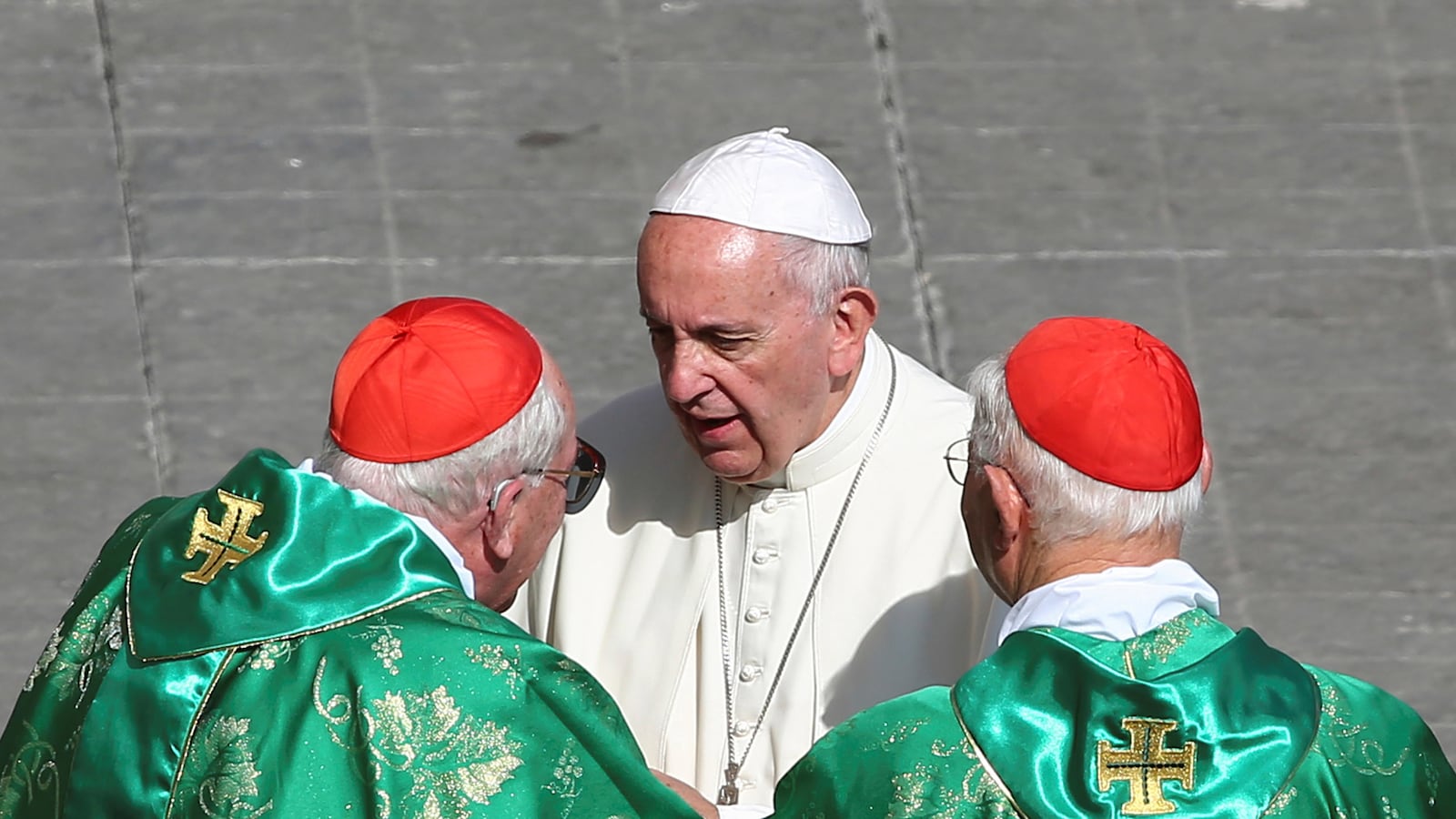ROME — Pope Francis has never been one to mince words, even when he doesn’t say anything at all. And it certainly doesn’t take much reading between the lines of his choice of new cardinals, who will receive their red hats next month, to see that he is stacking the deck to ensure his eventual replacement thinks just like he does.
Among the 17 new cardinals he named on Sunday, 13 are under 80, and thus eligible to vote in any near-future conclave electing a successor to Francis, which, whenever it happens, will not be easy by any standard.
Among the new eminences, five unarguably are from the geographical margins, where Francis believes the church can do the most good. They are from Bangladesh, the Central African Republic, Lesotho, Malaysia, and Papua New Guinea—all countries that have never had a cardinal representative and whose Catholic experience is far different from most—and who will change drastically the demographics of the next conclave. Francis also chose men from Mauritius, Brazil, and Venezuela.
New Cardinal Dieudonné Nzapalainga of the Central African Republic, age 49, will be the youngest voting member of the College of Cardinals and, perhaps more importantly, is likely to be around for a very long time to provide what hitherto has often been a muted perspective on challenges in Africa.
Only three of the cardinals are European. One is Mario Zenari, an Italian who has been the papal nuncio to Syria since 1980. On hearing the news, Zenari said that making the nuncio to Syria a cardinal is a signal to the warring parties: “It is almost like a warning,” he said.
Another important European on the list is Spaniard Carlos Osoro Sierra, the archbishop of Madrid, who many call “the Spanish Francis” because he is so similar in pastoral style to Francis, and who is sure to start making the lists of the “papabili” or “popeable” contenders to replace Francis should he resign or pass away.
The third European is Josef De Kesel, the archbishop of Brussels, who has been tied to the cover-up in the clerical sexual scandal, but who, nonetheless, has the current pope’s ear on great issues within the European Catholic Church.
There are three notable American cardinals in the pack—the first American cardinals Francis has tapped in his papacy. But more important, perhaps, than who they are, is who they are not. For one, Francis did not tap Archbishop Charles Chaput of Philadelphia, who made headlines recently for his guidelines for divorced and remarried Catholics telling them not to have sex. Chaput was also on the scene during the decision last year to introduce Francis to Kentucky county clerk Kim Davis, who had refused to issued marriage licenses to same-sex couples.
Francis’s American choices all tend to be anti-Republican, pro-immigration prelates, including archbishop of Indianapolis Joseph William Tobin, who famously butted heads with Republican vice-presidential candidate and Indiana Governor Mike Pence on a measure to ban Syrian refugees from his state. Tobin resettled a Syrian family in his diocese in Indiana in cooperation with the U.S. Bishops Conference refugee and migrant program in direct defiance of Pence’s anti-Syrian refugee measure. A U.S. Federal court recently overturned Pence’s ruling, allowing Syrian refugees to be resettled legally in Indiana. Blase Cupich, the archbishop of Chicago, who hails from Nebraska, also made headlines at last year’s Synod on the Family for essentially siding with LGBT and divorced and remarried Catholics.
“If we’re really going to accompany people, we have to first of all engage them,” he said on the sidelines of the Synod. “In Chicago, I visit regularly with people who feel marginalized, whether they’re the elderly, or the divorced and remarried, gay and lesbian individuals, also couples. I think we need to really get to know what their life is like if we’re going to accompany them.”
Francis’s third American choice was far more expected. Kevin Joseph Farrell, is an Ireland-born American bishop who ministered in Washington, D.C., for many years before landing in Dallas, where he is a staunch gun-control advocate. Farrell had just been promoted and brought to Rome to head a new office on laity, family, and life questions, which clearly seeks to address the many issues of LGBT and divorced and remarried Catholics.
Vatican insiders say Francis wanted a cardinal to lead that new office to give it more gravitas, but he apparently also appreciates Farrell’s willingness to practice what he preaches on tolerance and openness in the church’s approach to marginalized Catholics.
“In one fell swoop, therefore, Francis has reshaped the character of the most senior level of the American hierarchy,” Vatican expert John Allen says of the American choices. “The outlook, while certainly defending church teaching on matters such as abortion and euthanasia, is more inclined to see them as part of a spectrum that also includes immigration, the death penalty, the environment, concern for the poor, and so on.”
Francis will crown his new princes of the church on Nov. 19, the last full day of his extraordinary Jubilee Year of Mercy in a consistory that will put his stamp of approval on 44 of the 120-strong college of cardinals who will play a major role in whether or not the Catholic Church after Francis will stay on its upward trajectory or fall back into the dark ages.






